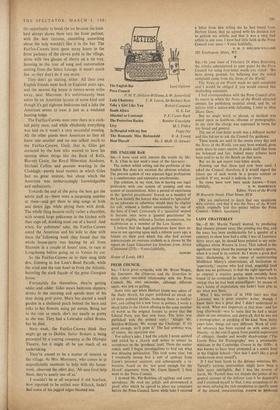PRESS COUNCIL
SIR,-1 have great sympathy with Mr. Bryan Magee, the Spectator, the Observer and the Guardian in their rather one-sided relationship with the Press Council. My own encounter, although different again, was just as galling.
Some time ago when Herbert Gunn was editor of the Daily Sketch, his paper published an attack on all three political parties, traducing them as ineffec- tive, and calling for a new force in politics. I wrote a sharp letter to the Sketch offering in the same number of words as the original feature to prove that the Liberal Party was that new force. The letter was published with the printed reply: 'Alright Mr. Sheldon-Williams. We accept the Challenge. If it's good enough, we'll print it.' The last sentence was, of course, the operative one.
For safety's sake, I had the article I wrote subbed and styled by a Sketch staff writer to ensure its acceptance on the 'goodness level. There the matter rested, until I began investigations to find out what was delaying publication. This took some time, but I eventually wrung first a sort of apology from Gunn's personal assistant, and subsequently a re- traction, based on the 'not good enough for the Sketch' argument, from Mr. Gunn himself. I then went to the Press Council.
I showed Mr. Pitt-Robbins all cuttings and corre- spondence. He read my article and pronounced it good, after which he agreed to place my complaint before the Press Council. Some while later I received a letter from him telling me he had heard from Herbert Gunn, that he agreed with his decision not to publish my article, and that it was a very bad article in any case. I have had little faith in the Press Council ever since.—Yours faithfully,






































 Previous page
Previous page